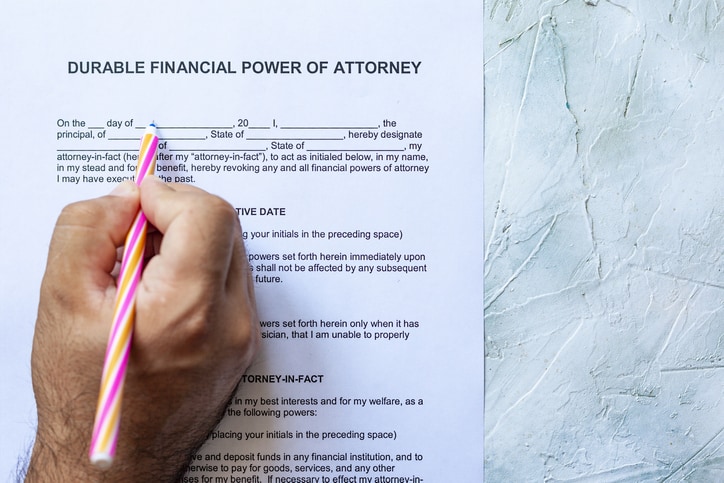A power of attorney is a document that allows the principal – the person signing it – to appoint an agent, or someone else to act on the principal’s behalf. For both healthcare and property, there is springing power of attorney and durable power of attorney. The one you choose can have a big impact.
A durable power of attorney becomes effective when signed, or a particular date if specified. It will continue to be in effect until the person who created it either revokes it or dies, or a stated expiration date is reached. In the event of an incapacity, the power of attorney should be in effect without further action.
A springing power of attorney is intended to become effective (or spring into effect) in the event the person is incapacitated. In theory, a springing power of attorney would allow the designation of an agent to be made, as if in reserve.
Unfortunately, the springing powers of attorney generally require that a doctor designate the principal as incapacitated, or unable to make decisions for himself, before the agent has authority to act under the power of attorney. This has led to greater uncertainty with a springing power than with a durable power.
There are at least three problems with a springing power that do not exist with a durable power.
First, there is the potential for delay. With a durable power of attorney, the agent could act immediately in case of an emergency. With a springing power, the agent must obtain the determination that the principal is unable to act. This may take days or weeks.
Second, state and federal law and regulatory requirements may inhibit the ability of the agent to obtain such a designation until he is authorized. One example is HIPAA, the Health Insurance Portability and Accountability Act of 1996. Designed to protect patient privacy, among other things, it creates a conundrum: an agent under a spring power cannot act until the principal is designated incapacitated, and he may have problems receiving the designation unless he has appropriate documentation from the principal waiving HIPAA’s requirements.
Third, a medical provider may have other definitions, beliefs, or incentives as to what constitutes incapacity. So while the doctor has no exposure to the principal’s daily needs for care, or for financial and business affairs to be maintained, that same doctor has the ability to withhold the very certification that allows the agent to act. In other words, a springing power enables a third party to thwart both the principal’s decision-making and the agent’s ability to assist the principal.
Because a power of attorney needs to be reliably in place should the need arise, principals should give serious consideration to whether a durable power or springing power best suits their needs, and for the springing power how best to manage the risks of certification, or effectively a veto, by a doctor.


